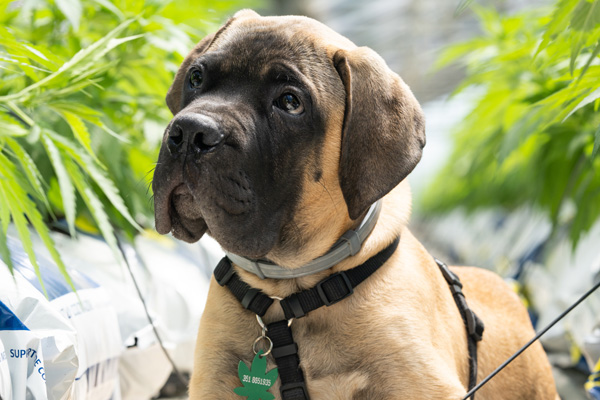Certainly, there is a growing curiosity amongst many pet owners about the use of medicinal cannabis for pets. As pet professionals, it may be a topic you are more frequently asked about. Or perhaps you have a personal interest in medicinal cannabis for pets. Either way, it’s an interesting area that’s rising in popularity.
We know that cannabis has long been used for its purported healing abilities. It’s alleged that cannabis can effectively treat arthritis, pain, depression, anxiety and inflammation – to name just a few of its potential benefits.
However, it wasn’t until the 1940s that cannabidiol (CBD) was isolated. This gave rise to pharmacological experiments using CBD oil. Since then, research has shown it to be effective in the treatment of childhood epilepsy. Furthermore, animal studies and anecdotal evidence suggest CBD may also assist with:
- Chronic pain
- Insomnia
- Anxiety
- Depression
- Inflammation, particularly due to arthritis
- Addiction
What we know about the efficacy of medicinal cannabis for pets
Pets can experience an array of symptoms and conditions similar to us humans. Thus, as the taboo surrounding the use of medical-grade cannabis slowly lessens, it’s no wonder there is growing interest in its use for our furry friends.
CBD Vets Australia states ‘Research has shown us CBD oil can reduce seizure frequency by as much as 33% in dogs with epilepsy. Additionally, it is believed CBD’s anti-inflammatory action is responsible for positive results in trials for dogs with arthritis, improving their mobility, owner described pain scores and quality of life.’
Indeed, a study into the analgesic efficacy of a cannabidiol (CBD) based oil in dogs with osteoarthritis shows a significant decrease in pain and increase in activity (p < 0.01) with CBD oil.
One veterinary study showed that CBD significantly decreased pain scores and increased mobility in a dose-dependent fashion among dogs with osteoarthritis.
Importantly, research also supports the use of CBD to help improve quality of life for dogs with chronic osteoarthritis-related pain.
When it comes to managing anxiety, other research shows that a single oral dose of CBD oil may be able to help relieve multiple measures of dogs’ stress caused by car travel or being left alone. Of course, further studies are still warranted, and not all furry patients respond, or respond as much as we’d like them to.
Initial experiments have given rise to further research into the use of medicinal cannabis for pets’ skin conditions, lameness, joint health, as well as palliative care. Without a doubt, medicinal cannabis for pets is a growing topic of discussion. As such, more pet owners are turning to their vets wanting to discover if CBD is suitable for their pet’s ailments.
Is CBD for pets legal in Australia?
It was only in February 2021 that it became legal to purchase medicinal cannabis in Australia. Low-dose CBD products were downgraded from a Schedule 4 (prescription only) to a Schedule 3 (pharmacist-only medicine). While this is good news for any humans wishing to purchase CBD for their own ailments, what about its use on pets?
Pet owners who want to purchase medicinal cannabis for their furry friends must ask their vet to prescribe the medicine. In order to do this, the following must apply:
- Cannabidiol must comprise 98% or more of the total cannabinoid in the product
- Any cannabinoids other than cannabidiol must be only those naturally found in cannabis
- The pet owner must consent to using an unlicenced and potentially harmful treatment
- The pet must receive appropriate monitoring to identify and potential side effects
Common questions about CBD for pets
Certainly, there are many questions and concerns surrounding the use of medicinal cannabis for pets. It’s likely that vets will be addressing a growing number of questions on this topic. Understanding common questions and being at the ready with a response can help put pet owners’ minds at ease. Here are some widespread questions and answers.
Q: Is CBD safe for pets?
The safety and adverse effects of using medicinal cannabis for pets have not been well researched. One study shows that hemp-derived CBD (administered over a 12-week period) is well tolerated. However, cats metabolise CBD differently from dogs. Furthermore, the scarcity of research in this area means we don’t yet have sufficient data to confirm either the efficacy or safety of CBD for pets.
Q: Is CBD for pets the same as for humans?
It’s important that medicinal cannabis for pets is free from any ingredients that may be toxic to animals. For example, dogs have an increased sensitivity to THC. Nonetheless, in some instances very small amounts of THC combined with CBD may prove beneficial in dogs. This is why any trials of medicinal cannabis for pets should be conducted in consultation with a vet.
Q: How do you administer medicinal cannabis for pets?
CBD for pets is available in liquids and capsules and can be mixed with pet food for ease of administration.
How common is this topic in your practice?
Information sources:
History of cannabis. Lambert Institute for Cannabinoid Therapeutics. Sydney University. Accessed online: https://www.sydney.edu.au/lambert/medicinal-cannabis/history-of-cannabis.html
Grinspooon, P. Cannabidiol (CBD)–what we know and what we don’t. Sept 2021. Harvard Health. Accessed online: https://www.health.harvard.edu/blog/cannabidiol-cbd-what-we-know-and-what-we-dont-2018082414476
Rapin, L., Gamaoun, R., El Hage, C. et al. Cannabidiol use and effectiveness: real-world evidence from a Canadian medical cannabis clinic. J Cannabis Res 3, 19 (2021). https://doi.org/10.1186/s42238-021-00078-w
Richards, R. CBD for pets in Australia. Aug 2021. Investing News Network Australia. Accessed online: https://investingnews.com.au/cbd-for-pets-in-australia
Latest posts by Liz Walden (see all)
- Pet health: Medicinal cannabis for pets - December 27, 2021
- What pet business insurance do I need? - November 17, 2021
- Pet sitters: how to take time off - November 15, 2021










Hi. There is a misconception that cannabis medicines can be prescribed for animals in Australia. This is not the case. Cannabis medicines (including CBD) are unregistered and require TGA special access scheme (SAS) approval to be prescribed for humans. They cannot be legally prescribed for animals, despite the appearance of multiple online vet companies and suppliers claiming as such. Further, you comment of CBD being schedule 3. Please inform yourself correctly. The TGA approved a certain low amount of CBD, in a maximum pack size, as CBD as long as it was ARTG registered. To date no CBD products have received this registration, therefore, there are NO schedule 3 CBD products available in Australia. In order to become registered the company needs to prove quality, safety and efficacy. No one has done so yet. May I suggest you check your facts, check with the TGA (and not rely on the online vet company stating CBD can legally be prescribed for animals) before spreading misinformation. The onlien vet company has been reported to the TGA who will investigate them. Signed, a pharmacist.